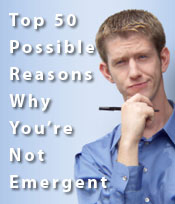Two bloggers, that I read often, have posted dialogs on egalitarianism. This is the long running conversation on the role of women in church and delves into the question, “are women equal?”
David Fitch’s comments here.
Makeesha Fisher’s comments here.
I understand both positions and coming from a male perspective have wondered what it would be like to be a women in a male dominated society. The church has always been patriarchal. For some reason God chose to use men as the primary leaders in his mission of restoration. All the fathers of the faith are men (Noah, Abraham, Moses, David, Joseph, Isaiah, Jeremiah, etc.). Jesus chose twelve men to be his disciples. Paul wrote the primary bulk of the New Testament epistles. The role of men in God’s mission is just obvious.
But women also do play an important role in his mission. None of those men would be here if it weren’t for their mothers. When I look at the women in Scripture, especially the women who followed Jesus, they seemed to get it more than the men. The first person to anoint Jesus was a woman. It was women who were with Jesus at the cross. It was a woman who sat at Jesus’ feet. It was a woman who first went to visit Jesus at the grave. Women just seem to get it before men sometimes.
I don’t really want women to be equal in the traditional sense, always competing for the top rung, whatever that is. I don’t want women to be like me or like my buddies. I think when women try to be men, they miss the beauty of what it means to be feminine. The women I know who try to compete with men inevitably miss their own humanity. What I really want to know is why God chose to make us different. What is the real value of our differences?
I didn’t choose how God lives out his mission of restoration. I didn’t set humanity and gender roles. God did. I also don’t want women to be reduced to subservient add-ons that serve a purpose when we need them sexually, or for care-taking purposes. So how to we find a way to coexist in harmony and congruence, especially in leadership? Maybe there’s a third way, a way that elevates women to the glorious gift that they are in our lives.
I do want to see women the way love would see them. I really liked how Makeesha states this. How do we discover and lift up each other’s humanity? How do we, as men, lift up women? I just know that love elevates.
So I’m left with a wonder that men, in our silly need to subjugate women, we may be missing something. Maybe women sometimes see it better than we do. And when they are pushed down we miss one of the real ways that God is speaking to us. I know that when I really need to listen to God, my wife is one of the first people I trust to speak honestly with me. She has been one of the primary ways I hear how my Heavenly Father is speaking to me. She has validated what I am feeling (even when I don’t like it) more often than I care to admit.
Maybe if men learn to listen to women a little more, we’ll begin listening to a different voice that has always been available to us, a voice of reason and compassion. A voice of love. Maybe men have spent so much time pushing women down, we’ve missed one of God’s glorious ways of speaking to us, providing us wisdom when we most need it.
So my question is, “How do we find a way to lift women up in the church?”
Read Full Post »












